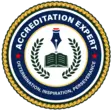Accreditation Approval Higher Education
Securing accreditation approval in higher education goes far beyond compliance—it’s a strategic foundation for institutional credibility and student trust. Accreditation determines eligibility for federal funding, employer tuition reimbursement, and transfer of academic credits, making it a critical factor for both student success and institutional growth. Learn more about the benefits of accreditation approval for colleges and universities.
Whether you're pursuing initial or renewal approval, postsecondary accreditation affirms the integrity of your academic programs, the qualifications of your faculty, and your commitment to student learning outcomes. It's a rigorous process guided by field experts, ensuring your institution meets recognized quality standards and is positioned for long-term success.

Maintaining compliance and accreditation readiness is essential for higher education institutions to remain eligible for funding and meet evolving state and federal requirements. With expert support, institutions can prepare for site visits, address gaps through readiness assessments, and strengthen their overall academic and operational framework. Explore our accreditation approval consulting services to navigate the process with confidence.
Maintaining accreditation approval for college and university is crucial for the financial stability and growth of your institution.














